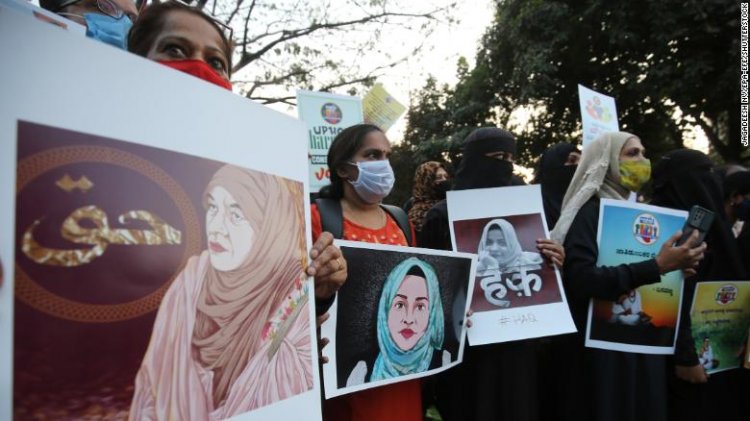Indian court upholds hijab ban in Karnataka state that prompted weeks of religious clashes
The dispute was seen as a symbol of deepening religious tensions in the state, where authorities ordered the closure of all high schools and colleges for several days to discourage protests in early February. Rallies in the state's capital, Bengaluru, were also banned outside educational institutions for two weeks.

Weeks after religious riots erupted over the right to wear the Islamic garment in schools, an Indian high court upheld a ban on the wearing of hijabs or headscarves in educational facilities in Karnataka state.
On Tuesday, the state's highest court declared that the hijab is not a "essential religious practice in the Islamic faith," dismissing a series of petitions filed by Muslim students who were denied access to classrooms at different schools and institutions around the state.
The court also determined that requiring students to wear school uniforms is a "reasonable restriction" that is "constitutionally permissible and to which the students cannot object."
"I implore that everyone obey the high court ruling and maintain peace and order," Bommai said Tuesday to reporters. "And let the kids go about their schoolwork as usual."
The dispute emerged after students held a brief demonstration in January demanding that they be allowed to wear their Islamic clothes inside the classroom.
Right-wing Hindus wearing saffron scarves — a color associated with Hinduism — and singing a religious Hindu slogan in support of Indian Prime Minister Narendra Modi's ruling Bharatiya Janata Party staged counter-protests (BJP).
Thousands of women from around India, including the capital Delhi, Hyderabad, and Kolkata, marched in support of the Muslim girls.
State officials had backed the hijab ban, citing the state's religious dress code.
Experts and campaigners, on the other hand, think that the hijab controversy is symbolic of a bigger crackdown on India's minority Muslim community since Modi's BJP came to power nearly eight years ago.
The BJP governs Karnataka, which has only a 13 percent Muslim population and has already approved legislation that critics claim privileges Hindus.
"We are pleased with the decision. However, we have yet to discover the cause for this "Shatabish Shivanna, one of the girls' lawyers, told CNN about the decision on Tuesday. "We'll talk to the petitioners, and then we'll figure out what legal options we have."

 Boakyewaa Lawrencia
Boakyewaa Lawrencia 


































